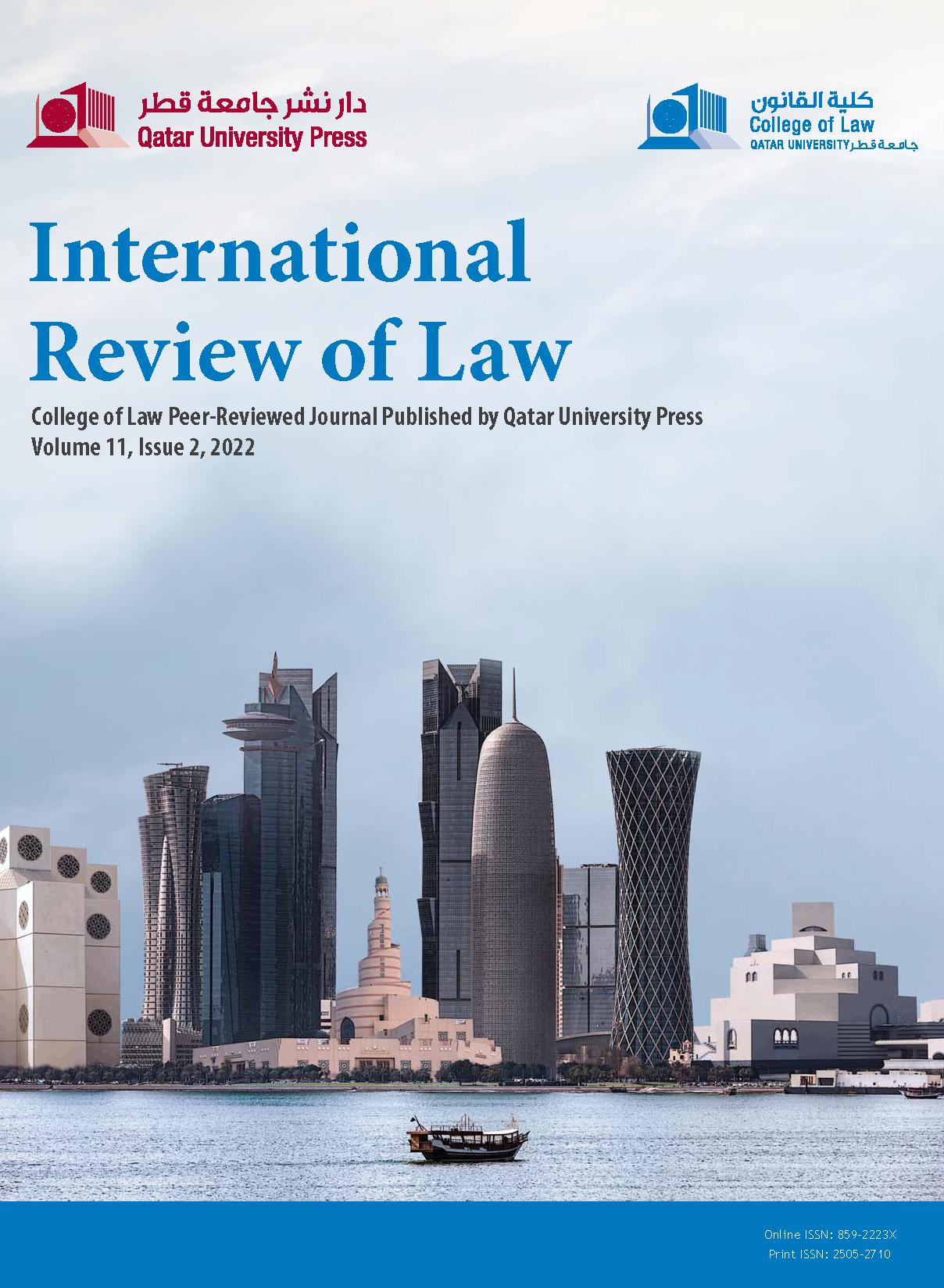Political Predispositions of Constitutional Judges and their Impact on Causation of Judgments in Iraq
Abstract
This research examines the hypothesis that constitutional judges in Iraq may invoke their values, orientations and beliefs in their review of the constitutionality of a specific law. Can the judge use these values, especially the political ones, in the decision’s rationale? This hypothesis is based on two considerations, the first is that the Iraqi constitution in force, opens a wide way for the constitutional judge when providing several sources that the they should refer to when examining the constitutionality of laws, which are Islam’s settled rulings and democracy, as well as the basic rights and freedoms contained in the constitution. The second consideration is that the constitutional judge is in direct contact with the political life in light of the process of their selection as a judge of the constitutional court which is often carried out by a political party. Also, the fundamental nature of cases under review are political matters. Therefore, it is difficult to strip the constitutional judge from their inclinations and tendencies, otherwise, he/she will become as a mere machine. The research concludes that it is necessary to give the constitutional judge a completely different work limitation from the ordinary judge that is often restricted by the legal text, where the limitations of the constitutional judge must be expanded in a way that balances the legal approach and political predispositions.
Metrics
##plugins.themes.bootstrap3.article.details##
Constitutional judgeJudicial reviewPolitical tendenciesConstitutional lawJudiciary independence
Al-Asyūṭī, Tharwāt Anīs. "Al-Qaḍā’ Al-Multazim wa Al-Sharʿiyyah Al-Thawriyyah," (in Arabic), Al-ʿadālah Magazine, no. 14, 2nd year.
Al-Maḥmūd, Midḥat. Al-Niḍām Al-Qaḍā’ī fī Al-ʿIrāq. Dirāsah Istiʿrāḍiyyah, (in Arabic), 2010.
Al-Nuwaijī, Muḥammad Fawzī & Al-Shimī, Abd Al-ḥāfiẓ Alī. "Tafsīr Al-Qāḍī Al-Dustūrī Al-Muḍīf wa Dawruhu fī Taṭwīr Al-Qānūn," (in Arabic), Magazine of the International Kuwaiti Faculty of Law, vol. 2, no. 2 (2004).
Al-Sayyid, Muḥammad Ṣalāḥ ʿAbd Al-Badīʿ. Al-Dawr Al-Siyāsī liQāḍī Al-Dustūr. Dirāsah Taḥlīliyyah Naqdiyyah libaʿḍ Al-Aḥkām Al-Dustūriyyah dhāt Al-Ṣibghah Al-Siyāsiyyah. (in Arabic), Dār Al-Nahḍah Al-ʿarabiyyah, 2010.
Al-Shāʿir, Ramzī. Raqābat Dusturiyyat Al-Qwānīn. Dirāsah Muqāranah, (in Arabic), Maṭābiʿ Dār Al-Nashrah, Cairo 2004.
Brown, Nathan J. & Waller, Julian G. Constitutional courts and political uncertainty: Constitutional ruptures and the rule of judges (International Journal of Constitutional Law 14(4):817-850, 2017).
Cole, Jared P. The Political Question Doctrine: Justiciability and the Separation of Powers (Washington, DC: Congressional Research Service, 2014).
Ely, John Hart. Democracy and Distrust: A Theory of Judicial Review (Harvard University Press, 1980).
Garrett, Brandon L. Constitutional Reasonableness (102 Minnesota Law Review 61-126, 2017).
Govney, Mc. The British Origin of Judicial Review of Legislation (93 Pennsylvania University Law Review 1, 1944).
Hamburger, Philip. "Law and Judicial Duty," 72 The George Washington Law Revie, vol. 1, no. 12, (2003).
Hirschl, Ran. “The Oxford Handbook of Political Science” in Robert E. Goodin (eds), The Judicialization of Politics (2011).
Hunt, Stacie. The Judicialization of Politics in Canada and the United States (Honors Projects, 2013).
Kauper, Paul G. "Schubert: Constitutional Politics, Schmidhauser: The Supreme Court, McClosky: The American Supreme Court," 59 The Michigan Law Review (1961).
Kelso, R. Randall. United States Standards of Review versus the International Standard of Proportionality: Congruence and Symmetry (39 Ohio Northern University Law Review. 455, 485 (2013).
Makiyyah, Firās Tāriq. Itiḥādiyyah Al-ʿulyā fī Al-ʿirāq. Al-Mu’assasah Al-Duwaliyyah lil-Dimuqrāṭiyyah wa Al-Intikhābāt, (in Arabic), Al-Munaẓẓamah Al-ʿarabiyyah lil-Qānūn Al-Dustūrī. Lamaḥāt Istrātijiyyah ḥawla Qānūn Al-Maḥkamah Al- Shāhīn, 2017.
Posner, Richard A. How Judges Think. New Delhi (Universal Law Publishing Co. Pvt. Ltd., 2008).
Smith, Tara. Judicial Review in an Objective Legal System (Cambridge Univ Press, 2017).
Shahin, Oday Talal Mahmood. Can the Federal Supreme Court in Iraq Apply the methods of Judicial Review in the Supreme Court of U.S.? (Alrafidain of law, 23 (73), 1-28, 2020).
––––. Raqabāt Al-Qaḍā’ ʿalā Al-Muwāzanah bayna Al-Manāfiʿ wa Al-Aḍrār fī Al-Qarār Al-Idārī. (in Arabic), Mājistīr, Kullīyat al-Ḥuqūq, Jāmiʻat al-Mawṣil, 2006.
Strauss, David. “The Living Constitution” (Oxford University Press, USA, 2010).
Tezcur, Gunes Murat. Constitutionalism, Judiciary, and Democracy in Islamic Societies (Polity 39(4): 479-501, 2007).
ʿUbayd, ʿAdnān ʿājil. "Al-Tabīʿah Al-Qānūniyyah lil-Qaḍā’ Al-Dustūrī," (in Arabic), Al-Muḥaqqiq Al-Hali lil-ʿulūm Al-Qānūniyyah wa Al-Siyāsīyyah, no. 2 (2016).
Wolcher, Louis E. A Philosophical Investigation into Methods of Constitutional Interpretation in the United States and the United Kingdom (13 Virginia Journal of Social Policy & the Law. 239, 245, 2006).
Zorzetto, Silvia. The Uses of Reasonableness in the Constitutional Interpretation and Arbitration: A Comparative and Theoretical Analysis about the Law in Action (KILAW Journal, Vol. 8, no. 8, 2020).
الأسيوطي، ثروت أنيس. "القضاء الملتزم والشرعية الثورية"، مجلة العدالة، ع 14، س2.
السيد، محمد صلاح عبد البديع. الدور السياسي للقاضي الدستور دراسة تحليلية نقدية لبعض الأحكام الدستورية ذات الصبغة السياسية، دار النهضة العربية، 2010.
الشاعر، رمزي. رقابة دستورية القوانين: دراسة مقارنة، 2004، مطابع دار النشرة، القاهرة.
شاهين، عدي طلال محمود. "رقابة القضاء على الموازنة بين المنافع والاضرار في القرار الإداري"، ماجستير، كلية الحقوق، جامعة الموصل، 2006.
عبد الرحمن، عاطف سالم. دور القضاء الدستوري في الإصلاح السياسي والاجتماعي والاقتصادي، دكتوراه، كلية الحقوق، جامعة عين شمس، 2010.
عبيد، عدنان عاجل. "الطبيعة القانونية للقضاء الدستوري"، مجلة المحقق الحالي للعلوم القانونية والسياسية، ع2 (2016).
المحمود، مدحت. القضاء في العراق -دراسة استعراضية، كتاب منشور في موقع المحكمة الاتحادية العليا، 2010.
مكية، فراس طارق. "لمحات استراتيجية حول قانون المحكمة الاتحادية العليا العراقية"، المنظمة العربية للقانون الدستوري، المؤسسة الدولية للديمقراطية والانتخابات (2017).
النويجي، محمد فوزي والشيمي، عبد الحفيظ علي. "تفسير القاضي الدستوري المضيف ودوره في تطوير القانون"، مجلة كلية القانون الكويتية العالمية، ع2، مج2 (2004).


